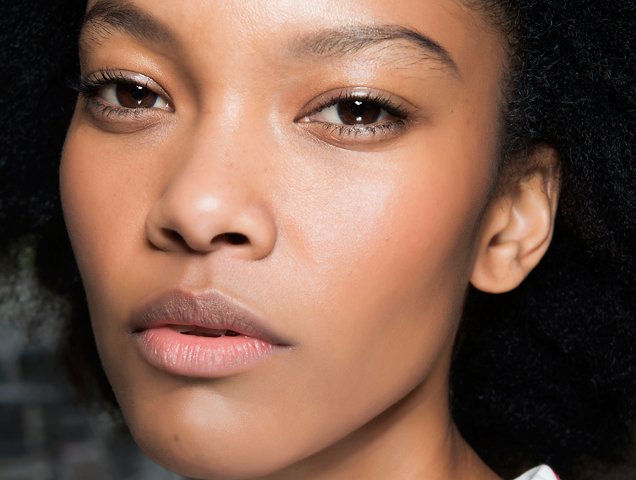Love, hate it, believe it or leave it: you can’t disguise much about your skin. While your mom will be the first to raise an eyebrow when you have a sunburn and your sibling will jokingly point out an untimely zit on your chin, dermatologists have similar reactions but for a different purpose. They don’t just notice pinkish skin, they can tell how often you’ve applied that recommended daily SPF 30. They don’t see a random pimple — but they do see if you’ve picked at a slew of outbreaks for months or years. It’s their job to be hypercritical and detail-oriented when examining your pores so they can provide the best treatment and advice to ensure your skin radiates. Here, top-tier dermatologists reveal what they first detect on your face from the moment you walk into their office.
[ Next: 5 Skin Care Ingredients You Can Mix Together — and 3 You Can’t ]
This article originally appeared on TotalBeauty.com
This Is the First Thing Derms Notice About Your Skin
-
If you wear sunscreen regularly

Of all the ways to ensure your skin is healthy and youthful, sunscreen is your strongest defense. So much so that nearly all dermatologists recommend applying SPF every single day, under or within your moisturizer — not only during the summer when sunshine makes a frequent appearance but year-round. You likely nod along when they remind you, but when you don't have your trusted doc harping over you — how diligent are you about this routine?
If you skip a day here and there, your derm probably won't call you out, but if you forget most of the time? Board-certified dermatologist Dr. Papri Sarkar says she can tell a difference. She regularly has people come in sunburned or with ink spot lentigos, which are dark spots that are characteristic of having had a bad sunburn in the past. "Folks often come in with a tan or lots of sun spots, which give it away too," she says. This is when she steps right up on that soapbox to educate her patients on the best sun protection practices. When left untreated over time, these spots not only pack on the years, but could potentially lead to life-threatening cancers, too.
Image: Imaxtree
-
How you wear your makeup

Though you may manage to wrangle an appointment first thing in the morning, most of the time you're squeezing in a visit to your derm whenever an opening is available. This means you might come in with a full face of makeup, which you hope will cover up your imperfections. Even if you have flawless coverage, cosmetic dermatologist Jeanette M. Black, MD says the way you apply your makeup reveals a lot about both your skin issues and your skin goals.
Specifically, she pays attention to contouring and highlighting, as well as any heavy foundation. "This helps me see what things they are looking to improve upon, especially when I am evaluating patients for cosmetic procedures. Patients will use makeup to hide redness, pigment irregularities or scarring, and it is important for me to notice how much makeup the patient is wearing so I can better evaluate their skin," she says. There's never any judgment in her examination, but makeup gives her a starting point to help patients make improvements in their skin so they are wearing less makeup with each follow-up visit.
Image: Imaxtree
-
If anything seems out of balance

Recently had a procedure like Botox or another injectable? Don't try and trick your dermatologist into giving you new injections before it's time. As board-certified dermatologist Dr. Michael Swann explains, skin care experts are trained to detect any sort of plastic surgery — for better or often times, worse. "The first thing I often notice is if anything seems out of balance, and the most obvious thing is when patients have cosmetic work done that is not natural or pretty," he says.
While this is a negative first impression, it's one Swann says is preventable if you do your due diligence to source a dermatologist you can trust. "I would much rather have a patient who has a problem with scarring, irregular pigmentation, wrinkles or sun damage, but looks natural: those are targets that we can improve," he says. "Even the most beautiful person immediately looks like they are trying too hard when they have an unnatural or overdone filler procedure or an overly tight facelift."
Image: Imaxtree
-
How your face moves

Ever watch a candid Instagram video your friend took of you and wonder, "Do I really look like that?" Most of our frequently used facial expressions are practiced without thinking: scrunching our eyebrow when we're working or focusing, raising our eyes when we get excited or clenching our jaw when we're in a stressful encounter. Though you might not be able to detect these intrinsic and intuitive movements, if you visit a derm like Sarkar, you'll find her taking notes on how your face moves.
"It gives me a clue as to what treatment might be best for them if they bring up treating wrinkles or fine lines," she says. "I never bring that up at a visit myself but I like to be prepared in case the patient wants treatment because every patient has different needs and the underlying muscle and fat pads are usually what determine the best treatment for them." So if your derm is carefully watching you? Don't be alarmed — he or she is doing his or her job.
Image: Imaxtree
-
If you're unhappy with your skin

It isn't just your exterior that dermatologists pick up on — but what's going on in your mind, too. If you've ever battled hormonal acne, consistent eczema or psoriasis, you know how debilitating skin issues can be. Not only do they impact how much powder your load on your face, but Black says many people struggle with self-confidence when they're having a breakout. As she puts it, not everyone is comfortable in their own skin — and it really shows.
"It is remarkable how much skin issues can affect our day to day lives. It is important to remember to get help with a board-certified dermatologist for skin problems as many things making patients uncomfortable can be addressed or prevented," she says. "Patients often say that they wish they had come in sooner as they have wasted time and money dealing with their skin problems prior to coming in."
Image: Imaxtree
-
If your skin is sagging

As we grow older — and wiser and sassier — unfortunately, our skin doesn't always stay up to par. Swann says that's why sagging skin is one of the first things he notices. "As we age, we lose facial plump, especially in people who remain thin as they age. Our face leaves arguably the strongest impression when we meet people," he says. "Sagging and wrinkled skin can change people's opinions about us and since these things are easy targets for improvement, I tend to take notice quickly when I meet someone." This opens the opportunity for Swann to recommend products or treatments to improve the quality of skin, revealing the radiance underneath the top layer.
Image: Imaxtree




